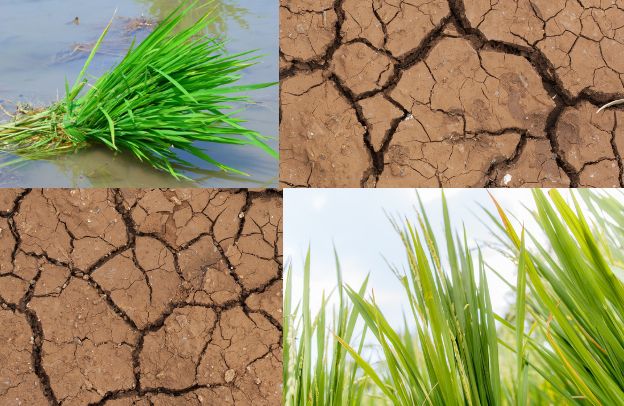The Seeds We Sow: Building a Thriving Agribusiness Future Together in the African Diaspora

When you think about food, what comes to mind? Maybe a family gathered around a dinner table or the aroma of rice simmering with spices evokes memories of celebrations and traditions. For the global African diaspora, food is more than just nourishment, it is culture, identity, and a key to unlocking economic growth. Among the various crops that symbolize Africa’s vast agricultural potential, rice stands tall. As the demand for food security rises, your involvement in the rice sector can do more than just fill plates; it can transform lives, foster collaboration, and grow wealth.
Want to learn more about storytelling? Start by downloading the first chapter of The Storytelling Mastery.
A Taste of Nigeria’s Rice Revolution
Imagine standing in a rice field in Nigeria with the sun hot above you, and the land stretching out, vibrant and fertile. Rice is life here. It is a staple food for over 200 million people, making Nigeria the largest rice producer in Africa, with an annual production of over eight million metric tonnes.
Despite these numbers, Nigeria imports a significant volume of rice each year to meet the rising demand of members of the diaspora, this is a call to action. The need for sustainable and resilient rice production offers immense business opportunities.
But here’s the thing; no one does it alone. The key to making a lasting impact is collaboration, not just with local farmers but with your diaspora peers across the globe. Together, you can share best practices, pool resources, and drive innovation.
The Interdependence of Rice Production and Food Security
Rice production and food security in Nigeria are intricately linked. For millions, a steady rice supply means survival. Rice provides carbohydrates, proteins, and essential minerals like iron and zinc, essential for good health.
An article on ResearchGate, “Nutritionally Enhanced Rice to Combat Malnutrition Disorders of the Poor,” highlights a critical issue: Major nutritional deficiencies, such as vitamin A deficiency, are alarmingly prevalent in countries where rice is a staple food. This deficiency can lead to severe consequences, including blindness and even death, particularly among vulnerable populations.
To address this urgent problem, Golden Rice was developed as a genetically modified rice variety enriched with vitamin A to combat malnutrition in at-risk communities. However, the journey of Golden Rice underscores the broader challenges in the realm of biotechnology.
From overcoming radical opposition to GMOs to navigating consumer acceptance and stringent regulatory frameworks, the case of Golden Rice serves as a powerful example of both the potential and the hurdles of biotechnology-derived foods. It showcases how innovation, when embraced responsibly, can play a transformative role in improving global food security and health.
As Africa’s population grows, the demand for rice will only increase. Investing in rice production, therefore, it isn’t just about profit but it’s about purpose. Your efforts can help address hunger, reduce malnutrition, and create more resilient communities.
- Hunger and Malnutrition: In Nigeria, an estimated 22% of children under the age of five suffer from chronic malnutrition. By increasing local rice production, you contribute to combating this crisis.
- Economic Stability: Agriculture accounts for over 20% of Nigeria’s GDP, and rice alone is a significant contributor. Enhancing local production strengthens food sovereignty and reduces dependence on imports.
Opportunities for Diaspora Entrepreneurs
Now, picture yourself as an agribusiness entrepreneur. You have an edge with access to global networks, diverse skills, and the ability to tap into funding sources not available locally. But where should you start?
- Partner with Local Farmers: Small and medium-scale farmers produce most of Nigeria’s rice. Collaborating with them ensures inclusive growth and uplifts rural communities.
- Adopt Technology: Innovations such as improved seed varieties, mechanized farming, and precision agriculture can boost yields and profitability.
- Government Incentives: Take advantage of government programs that offer subsidies, loans, and training to agribusinesses.
According to the “Feed Africa Strategy 2016–2025: ACSA Progress Report 2024” by the African Development Bank Group, agriculture holds a central and strategic role in Africa’s development.
It is key to driving economic growth, improving living standards, reducing poverty, and enhancing food and nutrition security. Despite its immense potential, current investments in African agriculture fall significantly short of addressing the challenges the sector faces.
To unlock agriculture’s full potential, a significant injection of public and private finance is required across all stages of the agricultural value chain—from smallholder farms to large-scale agribusinesses. Such investment would ensure that agriculture delivers transformative growth and widespread prosperity.
As part of the Bank’s High 5 priority areas (Feed Africa, Light Up and Power Africa, Industrialize Africa, Integrate Africa, and Improve the Quality of Life for the People of Africa), the African Development Bank developed the ten-year Feed Africa strategy.
This initiative aims to transform African agriculture into a competitive, inclusive agribusiness sector that generates wealth, improves livelihoods, and preserves the environment.
The strategy is driven by four ambitious goals:
- Ending poverty in Africa.
- Eradicating hunger and malnutrition.
- Establishing Africa as a net food exporter.
- Positioning Africa at the top of export-oriented value chains where it has comparative advantages.
A cornerstone of this transformation is shifting the perception of agriculture from being merely a way of life to becoming a thriving and profitable business sector. This reimagining of agriculture as a driver of economic and social progress is fundamental to achieving sustainable growth and prosperity across the continent.
See also Unlocking Africa’s Agricultural Potential: Opportunities for Western Investors
Overcome Challenges Together
Yet, like any journey worth taking, challenges will arise. Climate change, pests, diseases, and limited access to credit are just some of the hurdles rice farmers face daily. But challenges are opportunities in disguise, and this is where your expertise, resources, and collective knowledge can drive transformative change.
- Climate Change Mitigation: Equip farmers with tools and training to adopt climate-smart practices such as precision irrigation, drought-resistant rice varieties, and conservation agriculture. These methods not only increase resilience but also improve yields sustainably.
- Access to Finance: Champion initiatives that link smallholders to international lenders, microfinance institutions, and diaspora-driven funding platforms. Innovative financial models like group lending and crop insurance can help reduce risks and bridge the capital gap.
- Technology Integration: Promote the use of modern agricultural technologies like drones for field monitoring, mobile apps for real-time weather updates, and blockchain for transparent transactions along the value chain.
By addressing these hurdles head-on, you not only contribute to the growth of Africa’s rice industry but also play a vital role in strengthening global food security. Together, we can turn these challenges into stepping stones toward a thriving, sustainable agribusiness landscape.
See also Overcoming Challenges In Rice Production In Africa: Innovative Solutions
Harnessing the Power of Storytelling
In a crowded marketplace, how do you stand out? The answer lies in the art of storytelling. Stories captivate, inspire, and build connections that numbers alone cannot. As an agribusiness entrepreneur, your story is unique—a tale of resilience, bridging continents, and rewriting the narrative of food security and sustainability. Now, it’s time to share it.
- Marketing Through Emotion: Weave a narrative around the human impact of your business. Showcase how your rice farm empowers local women entrepreneurs, provides meals for underserved communities, or embraces sustainable practices that nurture the earth. When people see the tangible difference you make, they become emotionally invested in your journey.
- Social Media and Digital Campaigns: Leverage the power of storytelling on platforms where your audience lives. Use short videos, impactful images, and testimonials to tell stories of transformation on how every grain of rice you grow nourishes a child, supports a farmer’s dreams, or restores hope to a community. Engaging, authentic content can turn followers into advocates.
- Investor Pitches: Numbers are essential, but they rarely capture the heart. When pitching to investors, share the “why” behind your business. What inspired you to start? What challenges have you overcome? Investors connect with purpose-driven visions. A personal, passionate story can be the bridge between a “maybe” and a “yes.”
Your story is not just about your product; it’s about your passion, purpose, and the lives you touch. By mastering storytelling, you don’t just stand out, you will create a movement, turning your audience into supporters, partners, and lifelong advocates.
See also The Role of Storytelling in Agribusiness Marketing
Continuous Learning: Building Self-Improvement Skills
A thriving agribusiness depends not only on production but also on continuous personal and professional development. As an entrepreneur, your ability to adapt, innovate, and lead with confidence is as crucial as the seeds you plant.
To support this journey, platforms like AClasses Academy offer tailored courses designed to boost your business acumen and personal growth. Whether it’s mastering negotiation, enhancing public speaking, or refining your agribusiness strategy, there’s always an opportunity to elevate your potential.
- Commit to Lifelong Learning: In the fast-paced world of agribusiness, staying informed is non-negotiable. Successful entrepreneurs are lifelong learners who consistently seek out trends, adopt new farming techniques, and remain agile in the face of change. Invest in courses, webinars, and industry certifications that enhance your expertise.
- Build Strong Networks and Seek Mentorship: Success doesn’t happen in isolation. Engage with fellow diaspora members, industry experts, and mentors in online forums, seminars, and workshops. Networking allows you to share experiences, exchange ideas, and gain insights that help you avoid common pitfalls and uncover new opportunities.
- Prioritize Adaptability and Innovation: The agricultural landscape is dynamic, with new technologies and challenges emerging constantly. Entrepreneurs who thrive are those who embrace change, explore innovative solutions, and remain curious. Whether it’s adopting precision farming tools, using digital platforms to reach consumers, or testing new sustainable practices, be open to evolving your approach.
By committing to self-improvement and fostering a growth mindset, you not only elevate your entrepreneurial journey but also contribute meaningfully to the agribusiness sector. Every skill you sharpen and every connection you make strengthens your ability to drive sustainable success.
Stories That Inspire: From Challenges to Triumph
Consider the story of Olu, a Nigerian-American who returned home with a dream of building a rice empire. He faced initial skepticism, difficulty accessing land, and the daunting costs of irrigation. But Olu didn’t quit. He teamed up with diaspora peers and established a cooperative.
Together, they invested in solar-powered irrigation systems, shared market access strategies, and supported each other in tough times. Today, Olu’s cooperative feeds thousands while employing hundreds of local farmers.
Your journey, like Olu’s, will have ups and downs. But remember, every setback is an opportunity to learn and grow. Lean on your network, harness the collective wisdom of the diaspora, and never stop believing in the transformative power of agriculture.
Strategies for Enhancing Rice Production and Food Security
Here are actionable steps to enhance rice production and contribute to food security within your agribusiness venture:
- Strengthen the Rice Value Chain: The journey from farm to table involves multiple stages, each vital for quality and efficiency. Prioritize investments in post-harvest processing to reduce losses and improve grain quality.
- Invest in Infrastructure: Infrastructure is the backbone of agricultural success. Develop or partner with others to build essential assets like irrigation systems to combat water scarcity, cold storage facilities to extend shelf life, and transportation networks for seamless market access.
- Adopt Best Practices: Stay ahead by embracing modern agricultural techniques. Use high-yield and disease-resistant seed varieties to maximize output. Implement integrated pest management (IPM) to control pests while minimizing environmental impact.
- Foster Research and Development: Innovation is key to overcoming challenges in rice production. Partner with universities, agricultural research centers, and NGOs to explore cutting-edge farming technologies and resilient crop varieties.
By implementing these steps, you not only enhance your agribusiness venture but also contribute to the broader goal of food security, economic growth, and sustainable agricultural development.
Each action taken strengthens the foundation for a thriving rice sector, ensuring nourishment and prosperity for generations to come.
See also Transforming Africa’s Food Security Crisis into Agribusiness Prosperity
The Call to Action: Building Together, Growing Together
If there’s one thing history teaches us, it’s that unity is strength. As members of the African diaspora, you have a unique role to play. Together, you can transform agriculture, not only for Nigeria but for generations to come. Whether it’s sharing expertise, pooling resources, or learning through AClasses Academy, the possibilities are limitless.
Collaboration, storytelling, and lifelong learning are not just buzzwords; they are your pathways to creating impact.
So, roll up your sleeves, connect with others, and plant those seeds, both in the soil and in your community. Because together, you’re unstoppable. And every grain of rice you cultivate feeds not just bodies, but dreams. Let’s make them come true.
Want to learn more about storytelling? Start by downloading the first chapter of The Storytelling Mastery.





